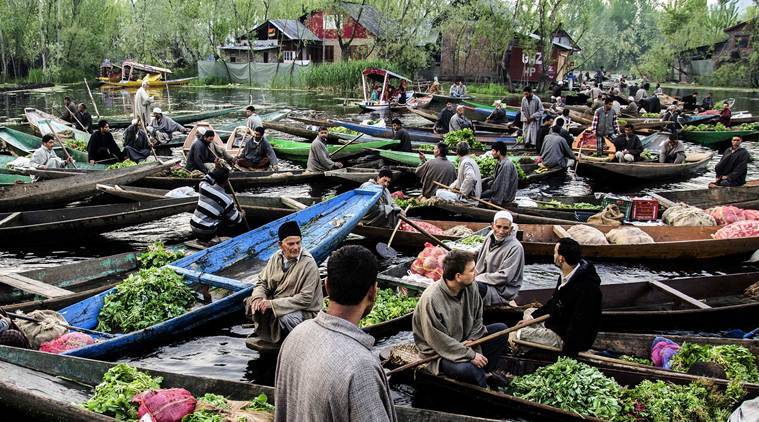History bears witness that whenever there is a dispute or political turmoil accompanied by violence the average person has to bear the brunt of the consequences. Kashmir is an example of such conflict with an unresolved legacy of partition that initially started as a territorial dispute but has now taken multiple dimensions. The protracted Kashmir dispute followed by instability, curfews, and subsequent shutdowns, resulted in the loss of human life and heightened animosity between two nuclear rivals. It also weakened the already crippling economy by accelerating the decline of sustainable development in South Asia.
Throughout history, Kashmir has been the victim of different occupations, but it went through the worst occupation of its history from the self-proclaimed largest democracy in India, on August 5, 2019. The move confined Kashmiris to an open prison through draconian laws and immensely dented the local economy. The Kashmir conflict has severely impacted important income-generating industries such as agriculture, horticulture, handicraft industry, and tourism industry. These sectors are critical to the survival of indigenous Kashmiris but the conflict environment has prevented people from fully utilizing them.
According to the Kashmir Chamber of Commerce and Industry, the longest-ever curfew leading to a complete halt to trading flow and exports has cost the region more than $7 bn. It has slowed the per capita GDP growth. Furthermore, the government has failed to attract foreign direct investment in the region. Foreign investors claimed that Kashmir is beautiful but not conducive to investment due to the political turmoil.
The loss of special status has paved way for settler colonialism which entails displacing the indigenous people and replacing them with outside settlers. A potent example of that is the new domicile law introduced in 2020 via Jammu and Kashmir Reorganization Order. It allowed aliens to settle in occupied Jammu and Kashmir to permanently change the demography of the region by bringing more Hindus to a Muslim-majority Kashmir. Reports suggest that in June 2020 nearly 25,000 illegitimate domiciles were awarded to outsiders. BJP government claimed that this move will secure jobs in Kashmir but it seems to be against the interest of unemployed youth and businessmen in Kashmir.
The rampant flow of businessmen from outside the state has deprived local businessmen of their jobs and massive exploitation of local resources. It raised fear among locals regarding reservations of government jobs. For a state with an unemployment rate of 15.98%, the new domicile law has aggravated the tension to an unimaginable level. These developments are marginalizing the majority Muslim population as big urban companies are moving the profit out of the region. In this alarming situation, the locals must not sell more land to outsiders so their generation must not be compelled to live in another Palestine.
Tourism accounts for 8% of the state’s GDP and is thought to be the backbone of Kashmir’s economy. Due to the conflict, Kashmir has been deserted for tourists for a long time. The stripping of special status followed by a global pandemic further worsened the situation. In the tourism sector, 74,500 jobs were lost. Nearly 3000 hotels in the valley were empty and the hotel staff was reluctant to return due to lack of transport and the prevailing fear. Furthermore, 5000 travel agents have also lost their job as they were unable to connect to the outside world due to a communication blockade.
The political upheaval in Kashmir is affecting not only the tourism industry but also the commerce, education, and health industry in unprecedented ways. According to the Kashmir Chamber of Commerce and Industry, the general commerce sector employing 1.20 lac people ranks first in terms of job losses in Kashmir. Almost 12,000 jobs were lost in the horticulture, floriculture, agricultural, and sericulture sectors. Furthermore, 60,000 jobs were lost in transportation, and 20,000 jobs in construction and power projects.
In the agriculture sector, apple cultivation which accounts for 12-15% of GDP was badly affected due to back-to-back lockdowns, suspensions of trade, and covid-19 pandemic. In north Kashmir “Fruit Mandis” were closed and there was difficulty in finding a buyer and shipping apples which caused apples worth million to rot. In south Kashmir, the region’s famous apples were not even harvested from the trees. The industry faced another hard hit when in September 2022, 8000 trucks carrying millions of dollars of apples were stalled on Srinagar-Jammu Highway. The apple growers and former Chief Minister of State claimed that it was deliberate attempt to make the people of Kashmir suffer.
The famed handicrafts sector was also significantly affected. In the carpet industry, 70,000 people lost their jobs as they were unable to receive orders overseas due to the internet shutdown. Three decades of conflict have marred the handicraft industry and two lockdowns in 2019 and 2020 baldy hit the sector. People were unable to sell Kashmiri handloom and handicrafts even online.
If promises are made to be broken then Kashmir should be summoned to prove this proposition because these broken promises haunt the history of Kashmir and explain its tragedy. In 2019, the fascist Modi regime made another false promise to bring normalcy and end the violence in the conflict-ridden region but the situation has only gotten worse. They introduce new domicile laws to promise job opportunities but the criterion to obtain the new domicile signals the arrival of settler colonialism. India has purposefully crafted a compelling narrative of progress and development to legitimize its oppression. The events that unfolded after August 5, 2019, including militarization, communication blockade, travel restriction, and business shutdown have caused unprecedented damage to the economy. The Fascist Modi regime’s hardline tactics have ripped the social, political, and economic fabric of Kashmir. With its colonial ambitions under the guise of economic development, India is squeezing out Kashmiris from economic gains reaped from their lands.
The writer is currently affiliated with National Defense University, Islamabad and is also working as Research Associate at IPCA.





